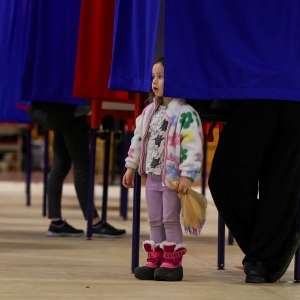‘It hits government too’: With cuts on the horizon, here’s what to know about New Hampshire’s next budget cycle

The New Hampshire Statehouse dome Hannah Schroeder
|
Published: 11-29-2024 11:00 AM
Modified: 12-02-2024 2:20 PM |
It’s no secret that New Hampshire’s headed toward leaner times. Outgoing Gov. Chris Sununu hoped to get ahead of the revenue problem by asking state agencies to reduce their budgets requests.
Still, this year’s proposals totaled nearly $17 billion – more than $1 billion more from the current budget. On the horizon, the state still faces several potential big-ticket expenses, like education funding lawsuits, damages paid to victims abused at the youth detention center and construction of a new state prison, each of which could cost hundreds of millions of dollars.
Here’s what agencies are requesting so far and the unknowns that could overhaul state spending in the next budget cycle.
The biggest chunk goes toward health and social services, partly because it’s such a large umbrella of government programs. The Department of Health and Human Services, the state’s largest department, does most of that work.
“At any given time, they serve about 184,000 individuals on Medicaid, about 77,000 on the state’s Supplemental Nutrition Program, as well as housing supports for those experiencing homelessness, childcare, public health, etcetera,” said Jessica Williams a policy analyst at the New Hampshire Fiscal Policy Institute.
These programs account for 45% of agencies’ initial requests, according to a NHFPI analysis. This includes both the efficiency budget and other priorities.
The efficiency budget is the bare minimum the government expects it’ll need to fulfill legal requirements and accounts for $16.29 billion. Agencies also put forth $653.1 million in additional prioritized needs, which are items they hope to add if there’s enough room in the budget.
Health and social services would cost the state $7.7 billion over the next two years – a $1 billion increase from the current budget, Williams said, but that number will likely change. If the state reduces health and social services funding, that could impact things like Medicaid and housing.
Article continues after...
Yesterday's Most Read Articles
 Authorities believe mother shot three year-year-old son in Pembroke murder-suicide
Authorities believe mother shot three year-year-old son in Pembroke murder-suicide
 Concord Police investigating vehicle versus pedestrian accident in downtown
Concord Police investigating vehicle versus pedestrian accident in downtown
 Twelve acres near Concord Walmart cleared for future retail development
Twelve acres near Concord Walmart cleared for future retail development
 ‘It was all about people’: New Hampshire remembers down-to-earth ‘humanity’ of David Souter, retired U.S. Supreme Court Justice
‘It was all about people’: New Hampshire remembers down-to-earth ‘humanity’ of David Souter, retired U.S. Supreme Court Justice
 Concord Police arrest Franklin man following Facebook Marketplace armed robbery
Concord Police arrest Franklin man following Facebook Marketplace armed robbery
 New Hampshire lawmakers weigh equity and impact of expanding casino industry
New Hampshire lawmakers weigh equity and impact of expanding casino industry
The next largest spending category was education, coming in around $3.5 billion, or 20% of the budget. Money for schools comes from statewide property taxes, part of business and tobacco taxes, and a few other sources.
Other parts of the budget are smaller but still significant. Here’s what else state agencies have allocated for other categories so far, according to NHFPI.
■$2.02 billion for Justice and Public Protection, about 12%
■$1.62 billion for Transportation, about 10%
■$1.11 billion for General Government, about 7%
■$1.02 billion for Resource Protection and Development, about 6%
New Hampshire had a $146.5 million cash surplus year-to-date at the end of October, but Phil Sletten, the NHFPI research director, said in addition to an encroaching revenue slump, several other major factors present unknowns for the state during this budget cycle.
Ongoing lawsuits, new developments and uncertain federal funding could add hundreds of millions of dollars.
Liabilities from multiple lawsuits currently under review by the state Supreme Court could create financial pitfalls for the state. Hundreds of legal claims of sexual and other abuse at the former Youth Development Center are already costing the state millions.
“Some of these cases go back years and decades, and we don’t know how much money that is going to end up costing the state in liability, but that could be hundreds of millions of dollars that the state would have to find the resources to pay,” Sletten said, even if it’s not all at once.
Other legal action could reshape New Hampshire’s model for education funding and force the state to pay more toward public schools.
“I don’t know if it will or not, but that is a potential additional expenditure,” Sletten said.
The state is also embarking on its largest capital project ever: a new men’s prison, with a $600 million price tag. After the state pushed off rebuilding the current men’s prison in Concord for years, corrections officials say aging infrastructure at the current men’s state prison is in dire condition.
Lastly, Sletten said, the future of federal funds is also uncertain. During the 2023 budget cycle, about one in every three dollars of state revenue came from the federal government. With potential changes at the federal level, some state spending is up in the air. This would apply to things like Medicaid, transportation grants, environmental grants and many other services, Sletten said.
“If federal funding changes, what are the timelines of those changes? What are the magnitudes of those changes?” Sletten said. “Those are all important questions that the state policymakers may have to consider this budget cycle.”
He also stressed that these factors may not be finalized for a while, even by June, when some form of spending will have to be authorized by the Legislature.
Now that state agencies have proposed their own budgets, it’s up to Governor-elect Kelly Ayotte to review them and draft her own version of the budget. She has to present that to the Legislature by mid-February.
Then, both the House of Representatives and the Senate will take a stab at it, going through various rounds of additions, cuts and other changes.
Sletten said the initial amount proposed by agencies is likely to decrease a bit once the budget gets through the Legislature.
“I don’t have a crystal ball for you to definitively say one way or another,” he said, “but the $16.9 billion figure is likely larger than we will see proposed by either the governor or the House or the Senate.”
Charlotte Matherly is the statehouse reporter for the Concord Monitor and Monadnock Ledger-Transcript in partnership with Report for America. Follow her on X at @charmatherly, or send her an email at cmathe rly@cmonitor.com.







 ‘A wild accusation’: House votes to nix Child Advocate after Rep. suggests legislative interference
‘A wild accusation’: House votes to nix Child Advocate after Rep. suggests legislative interference  Sununu decides he won’t run for Senate despite praise from Trump
Sununu decides he won’t run for Senate despite praise from Trump Town elections offer preview of citizenship voting rules being considered nationwide
Town elections offer preview of citizenship voting rules being considered nationwide Medical aid in dying, education funding, transgender issues: What to look for in the State House this week
Medical aid in dying, education funding, transgender issues: What to look for in the State House this week
